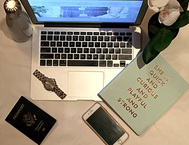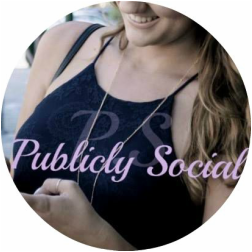|
The Christmas decorations have been on the shelves since Halloween, but now that Thanksgiving has passed, we’re in full-blown, end of the year holiday mode, filled with cheer, family time and resolutions.
And although I would love to segue to the next holiday, it’s still just a bit early to move past Thanksgiving, especially when we have so much to learn from the infamous task of carving the turkey. So what are the takeaways from carving a turkey? Well, similar to PR, carving the turkey is the "main event" of the day. If the turkey is a mess, chopped into unappetizing pieces and not presented well, the main event is ruined. Same goes for public relations. PR manages the way brands are presented; the minute that positive presentation falls apart, your brand falls apart. So, whether you were in charge of carving the turkey, or you just enjoyed the benefits of it, here are a few things you can take away from the tedious, yet extremely important task: Preparation is everything: When you carve a turkey, you can’t just pull it out of the fridge/freezer and start carving away. You need to roast the bird, let it sit at room temperature, transfer it to a carving board, etc. In PR, when you’re writing a pitch or a press release, you cannot begin the process blind. You must do your research, have a plan, know your goal, and know who your audience/media target is. Without that preparation, your pitch or press release will fall short of fabulous! Take care of the legs: Once your turkey is ready to be carved, it’s time to take care of the legs/wings. They must be removed before any other part of the turkey can be carved. When you’re writing any piece of content in PR, you must take care of the heavy lifting first. Getting that overall structure and answering the question, “Why should anyone care,” is first and foremost, and will make your writing more efficient. Take out the fluff: After you remove the drumsticks, it’s time to take out the stuffing. When you’re going through your last round of edits on a pitch, press release, or media alert it’s important to remember that reporters and media experts don’t want to read the fluff, so take it out! Only keep the information that adds to the overall “story”; the rest is not necessary. It’s sometimes difficult to keep the skin intact when you’re taking out the stuffing. Remember to keep your overall structure, that’s what holds your press release or pitch together. Slice it up: Once the turkey is prepped, it’s time to cut up the meat. The way you present content is everything! If your pitch or release has heavy bulks of content, break up your paragraphs, add a bulleted list, and bold important items. It’ll help make your content more digestible. Separate your meat: Remember your audience. Some people like the dark meat, some people like the light meat, and some people like the drumsticks. Keep your audience in mind and remember that media in each outlet is different. A radio producer will not want the same information that a TV producer will want. Separate your audiences and you’ll be able to target each in the most efficient way. P.S. Just because you carved the turkey, doesn’t mean you can control how it gets placed on the table. In PR, you can present your brand in the best way possible, and do all the prep necessary, but how reporters and the media choose to spin that information, is out of your control. That’s why it’s important to monitor your coverage, and remain professional when dealing with the media in order to maintain those positive relationships.
0 Comments
 The time has come!....the first day at your new job. Maybe it’s a new career, or just a lateral move in your field. The first day of a new job is highly anticipated. There are many mixed emotions: nerves, excitement, uncertainty, unease...and there is no way to know exactly how the first day will go, regardless of how prepared you may feel. There are certainly some things you can do/bring before your first day to ensure you fit right in and are ready for this big change in your life. What to do before your first day:
What to bring with you:
P.S. You’re a lot stronger, more confident and more qualified than you may think. Go kick butt on your first day and make a lasting impression that will set the tone for your work ethic and attitude the rest of your time at the new company! And, if you have any specific questions, don’t hesitate to shoot me an email at [email protected].  Am I someone who should go into public relations? The public relations field isn’t one that you just fall into because you have nothing else to do. It takes a special type of person to work in PR and it may not be for everyone. If you’re thinking of making a career in PR, take a brief look at the list below. If you meet 2-3 of the qualifications below, I would suggest exploring other options! You don’t like actually talking on the phone. Yes, I mean putting the phone up to your ear and actually talking. Often times you will be pitching, coordinating, following up and confirming over the phone. You need to be confident in your ability to speak out loud, not just send emails and texts. You turn your phone off or on silent on the weekends. No matter what you have going on, in order to be successful in PR you need to always be available for your clients. A client event, segment, or crisis is always a possibility, therefore you are essentially always on call and there to support your clients in any way you can. Social media is a nuisance to you. It’s important you are constantly scanning the news, are current on the latest trends and buzzwords, and are aware of what’s going on in your work environment and climate. You get overwhelmed with a long to-do list. If you are balancing multiple clients’ accounts, you will always have something to do. You’re not a coffee person. Chances are, you will use caffeine to get you through your workday. If you’re not a coffee person and are adamant about going into PR, I highly recommend you try tea. Mornings are foreign to you. Many of your segments will be early in the morning, so if you’re someone who likes to roll out of bed around eight or nine, a job in PR may not be for you. You are unorganized. If you are planning to go in to PR, you better be able to prioritize and stay on task. If not, you will be quickly drowning in your workload. P.S. If you are someone who loves relationships, making a company or organization’s voice heard and managing events and media coverage, PR is just the career for you! Interviews are more than just a way for a future employer to see if he or she thinks you are qualified for the position or thinks you will make a good addition to the team. They also allow you to see if you will fit in at the company and if you will enjoy your new job.
So, your interview is almost over. Your interviewer has gone over what the typical day in the office looks like, explains what your potential roles will be and asks you if you have any questions for him or her. Although it’s good to know everything you need to know, chances are you don’t. Unless they have offered you a position on the spot, it’s too early to ask about pay and benefits, so what else could you possibly ask? Here are a couple of questions you may want to ask to show your interest and be prepared to accept or decline the offer (here, we assume you'll get the job): What do you hope the person that fills this position brings to the table? What are the next steps for the interview process? What about this company makes you love being the manager? Are their additional responsibilities that were not listed on the job posting? What would a successful day look like for someone with this job title? Would you like me to send you additional work samples? Is there the opportunity to grow in this role and company? How many are part of the team? Is this a temporary or permanent position? What are the regular business hours? P.S. Some of these questions can be answered prior to the interview with a simple search on the company’s website. Be sure to do your research beforehand. P.S.S. Now that your interview is over, go write your thank you note and get it in the mailbox that same day! Spring is officially here, which means the weather is beautiful, the anticipation for summer is growing, and for soon to be college grads, it is time to really buckle down on the job search! For those of you already in a career, it may be time for a change. In honor of the new season, here are ways for you to spring forward in your career.
P.S. While you’re in the spring spirit, get to spring-cleaning. Start with your desk. It’ll help you feel more organized and ready to tackle your next task!  No matter what field you’re in, finding your specific niche can be very challenging; as a desired niche may be apparent to some, it may not be so apparent to others. For example, someone may know they want to be a chef, but don’t know what kind of food they want to cook. People offer a simple solution and say, “Just cook what you cook best.” Seems easy, but it’s not always quite that simple. Just because you’re good at something, doesn’t mean it’s what you enjoy doing, what you can make a career around and what you are passionate about. The public relations field specifically offers you many different areas of focus and each one is very different. If you work in lifestyle PR, you are working with restaurants, retail stores, coffee shops, etc. If you work in travel or luxury PR, you are working with travel companies, venues, high-end brands, hotels, etc. If you work in fashion PR, you are primarily working with designers and clothing retailers. If you work in non-profit PR, you are working with non-profit organizations to ensure their voices and missions are heard. Either way, wherever you stand, or plan to stand in the industry, these are all very different. Deciding which industry of PR you will get into can be challenging. Some love the idea of the cutesy, girly side of PR, that allows cute social media posts, girly office accessories, restaurant opening events, etc.! At the same time, some want to do PR for a cause they feel passionate about, and are inspired to spread the message of. So, my best advice to you if you are trying to figure out which industry you are going to go into, is to get a taste of what you think you are interested in. Reach out to local PR agencies, seek internships, ask for informational interviews, and make sure you're getting a taste of what each industry is like. At the same time, when doing this, try to remember that you are an intern, or are working at an entry-level position, and this may not be the true taste of the industry. Give yourself time to understand the sector, give everything you have to understand how it operates, and from there, assess how much you truly want to be in that field of PR. At the end of the day, PR is PR and you need to know and understand your clients and those you work with in order to be successful. Try different industries out and if you truly feel like you’re pitching the media or writing a press release for a client, just because you have to, you’re in the wrong industry. Choose a field in PR that you have a connection with and be your clients' biggest advocate! P.S. As an oriental proverb states, “Choose a job you love, and you will never have to work a day in your life." As someone who is breaking into the PR industry, I am constantly looking for resources to help guide me through the process. I heard about Aliza Licht’s book Leave Your Mark and was immediately drawn to it. To call it a book, is a bit of an understatement. As stated on the back of the front cover, “Leave Your Mark isn’t an advice book – it’s a mentorship in 288 pages.”
This book changed my perspective on where I was in my life and gave me the motivation to go out and “Leave my mark…” Here are the best tips and most inspirational quotes from the book:
P.S. Reading through these quotes is not enough! Pick up this book A.S.A.P. It’s a must read for anyone diving into the industry.  Going to an interview is extremely nerve-wracking. We all know the many thoughts that run through our minds those minutes before walking through the door or picking up that phone call to answer five to ten of potentially, the most important questions that you will answer in your career, up to this point. Stress and nerves are good for some people and allow them to handle interviews like a pro, but for some, these nerves can totally take over their thoughts and control the way they perform. So how can you prep before an interview and what should you remember going in to it? Here is my list of what I do and how I stay confident during an interview:
P.S. Immediately following the interview, write your interviewers a handwritten thank you note and get it in the mail that day! Sending an e-mail is a great way to thank your interviewers for their time, but chances are that e-mail will just get lost in the hundreds of e-mails they get per day. A handwritten letter is a great gesture and stands out among the hundreds of e-mails.  Promotion and publicity are often used interchangeably; however, they have very different meanings and uses in the marketing and public relations world. When you promote a company, organization or individual, you are hoping to gain public attention. The act of promoting is done to make a company, organization or individual stand out from other competitors. It is a campaign or strategy to gain advertising placement and further stimulate buzz around the brand. Promoting can be free, fairly inexpensive or very costly depending on the route you plan to take. Ways to Promote – The following are a few tools publicists use to promote: · Build a strong website · Be present on social media and “promote” your Facebook page or create ads on Twitter · Share your gained and earned media with your publics · Reach out to your publics via letters, pamphlets, etc. · Contests or sweepstakes Once promoting has been done to strengthen the presence of a brand, publicity has likely been generated. Publicity is a method of promoting. Publicists gain publicity for their clients by pitching the media about a story idea, package or in-studio segment, in hopes of gaining media coverage for their brand. Because publicity is generated by an outside source but monitored and supported by a PR coordinator, a PR coordinator is not able to directly control what becomes public. Publicity is specifically what the media chooses it to be. It is very important for a publicist (or PR coordinator) to pitch media-worthy content in a positive and influential way. Depending how the media views the actions of the company, or event hosted by the company, publicity can be either negative or positive. In time of an internal crisis such as the current Volkswagon crisis, a publicist cannot control the immediate publicity surrounding the company or brand. From there, it would be a publicist’s job to respond to the crisis publicly. Once the crisis response and actions reach the media and becomes public, you once again have publicity. As long as it is managed in an efficient way, this publicity can turn the negative publicity into positive and can be the initial steps in repairing a damaged image or relationship with your publics. Due to publicity’s permanence, it can damage the career or reputation of a company or organization indefinitely. Just the same, publicity can positively influence the success of a professional and is determinant of the public’s view of them. Publicity and promotion can be seen as similar, however as explained, they are used in very different ways, by different departments and at different stages of campaigns. P.S. Positive publicity will not generate itself. You must create something newsworthy within your brand or organization and then make sure that information becomes public.  As someone who has had a number of internships, I have had plenty of experiences, both good and bad. I use to think that I knew exactly what I wanted to do and I could jump right into the job market after graduating college, having no internships. When I was entering college, internships seemed like a foreign idea and did not seem necessary. As I have made my way through college, I would have to say, that could not be farther from the truth. I cannot stress the importance of internships enough. In case you haven’t stepped into the internship world yet, or in case you are in the middle of it and a little lost, here is what I have learned from my internships: 1. Internships are not just for figuring out what you do want to do; They are also helpful in figuring out what you do not want to do. 2. Always bring a business card with you to all of the events you attend, especially networking events. Even if it just says your name and contact information, it is crucial to make sure you have a card with you. If you don’t have cards, get them made…today! 3. Always wear comfortable shoes! As an intern, you will most likely be running around doing things, in and out of the office. Do not wear shoes that hurt (even if they are cute,) because it is unlikely you will be sitting at your desk during your eight hours in the office. 4. Internships don’t always mean experience. You may be asked to water the plants, or get coffee for your bosses. But that’s okay. Often times, you need experience, in order to gain experience. Take that internship for what it is, learn what you do and don’t like, and go find yourself an internship where you can get some more hands-on experience. Even if you feel like you aren’t learning any real skills, at the very least, internships look great on your resume! 5. Internships don’t always mean “coffee maker.” When I hear people talk about internships, I often hear the myth that copying and getting coffee are the only things interns do. Sure, sometimes you can get stuck doing the busy work in the office, (hey, someone has to,) but a lot of the time, internships give you real hands-on experience and allow you to learn the ins and outs of the industry you want to enter. 6. Always be prepared and always say yes. If you’re lucky enough to land yourself an internship where you are able to get hands-on experience, and your supervisors want to offer you additional opportunities, take them. Always volunteer to do the extra work, always volunteer to be at events. 7. Start acting like part of the team. Chances are if you attend events with your co-workers, dress the part and fit in with the office culture, they will start to picture you as part of the team. 8. Just because it’s time to clock out, doesn’t mean you should and just because you aren’t off for another hour, doesn’t mean you should stay. Get what you need to get done for the day and get it done correctly. Then, do a little extra to get yourself ahead and organized. However long that takes you, is how long you should be there. Chances are, especially if you’re getting paid, your supervisor would rather you get your stuff done and then head out, versus killing time just to kill time. ***This may vary depending on your agency or company. 9. SMILE! This seems obvious, but I’ve gone in-to offices where I have seen interns, even regular employees for that matter, who look so unhappy to be there. Your internship is a great opportunity, so smile. If you truly are unhappy to be there, fake it ‘till you make it, or find a new internship. An internship is not permanent, so just remember that. Try to stick it out and gain what you can from the experience. 10. Follow up on your work, your team will be impressed with you if you do. Keep a list of your pending tasks, or things you need to check back on, and actually check back on them. Remind your team about something you are working on and update them on the progress. They will be impressed that you stick with your projects and will see you as someone who is organized and will trust you to handle future projects. P.S. In the event of #4 being the reality of your situation, make sure you know how your boss takes his or her coffee. |
AlexA typical social media savy, PR girl breaking her way into the industry and blogging about it every step of the way. Archives
November 2016
Categories |

 RSS Feed
RSS Feed